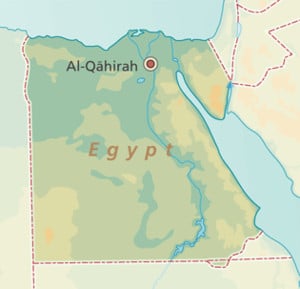Egypt
Quick facts
Overview

Egypt’s political history has been tumultuous in recent years. After the 2011 revolution, which ended the repressive thirty-year regime of Hosni Mubarak, there was a short experiment with democracy. The first free presidential and parliamentary elections were organized in 2012. Mohamed Morsi and the FJP (political branch of the Muslim Brotherhood in Egypt) became the winners. Unrest in the country remained, however. A few months later, in November 2012, President Morsi issued a temporary constitutional declaration that in effect gave him unlimited powers, which led to the outburst of mass protests. In July 2013 Morsi was removed from office by a coup d’état led by the army under General Sisi. In 2014 the general was elected president.
Political situation
President
In 2014, the former head of the Egyptian Armed Forces, Abdel Fattah al-Sisi, was elected president. In order to overcome the mass protests and chaos in the country, al-Sisi introduced a roadmap to help the transition of the country. One of the most important steps of the roadmap was the introduction of a new constitution, drafted by a 50-member committee. The constitution was approved by a referendum in January 2014, although serious doubts over the fairness and the political climate during the referendum have been cast. In 2019, Egyptians overwhelmingly approved another referendum on constitutional changes. Presidential terms were lengthened from four years to six, and instead of presidents being limited to maximum two terms, they are allowed three. These changes allow al-Sisi to stay in power until 2030.
Al-Sisi has cracked down hard on political opponents and independent media. Since 2015, many former Muslim Brotherhood leaders and members have been jailed, sentenced and completely banned from political participation. Journalists have been persecuted on a large scale and media freedom has been restricted. Furthermore, instability in the Sinai provinces has grown, where Islamist insurgents are fighting the Egyptian army. As a result, Egypt closed the Rafah border crossing with the Palestine Territories.
Egyptian revolution (2011) and following crisis
The Tunisian revolution that broke out in December 2010 sparked the Egyptian people to take to the streets as well. Starting from the 25th of January large scale demonstrations were organised in different cities in Egypt calling for an end to President Hosni Mubarak’s three-decade rule. Dissatisfactions over corruption, lack of freedom of speech, economic issues such as food price inflation, high unemployment, low wages and the enrichment of the ruling elite were the reasons for the protests. Mubarak repeated he would remain in power until September. Angry that Mubarak did not step down, protests resulted in a nationwide escalation dubbed ‘Farewell Friday’ on the 11th of February. At 16.00 hour the same day, the Egyptian Vice-president Omar Suleiman announced in a televised address that President Hosni Mubarak had stepped down and had handed over authority to the Supreme Council of Armed Forces (SCAF), which announced that it would remain in charge of the country until a president would be elected.
Egyptian voters overwhelmingly approved a referendum on constitutional changes a month later, which paved the way for new elections. From November 2011 – January 2012 the first free parliamentary elections were held in Egypt. The Freedom and Justice Party (FJP), linked to the Muslim Brotherhood, was the big winner. A few months later, Mohamed Morsi, leader of the FJP, was announced as the winner, becoming the first democratically elected civilian president.
In November 2012, President Morsi issued a temporary constitutional declaration that in effect gave him unlimited powers, which led to the outburst of mass protests. By the end of June 2013 the protests, which were also fueled by the prosecutions of journalists and attacks on non-violent protesters, escalated after opposition parties and millions of protesters urged Morsi to step down. In July 2013, Morsi was removed from office by a coup d’état led by the army under General Abdel Fattah al-Sisi.
The Muslim Brotherhood protested against the military coup, but these protests were crushed in the August 2013 massacre in Rabaa in which at least 817 civilians were killed. Since his overthrow, Egyptian prosecutors have charged Morsi with various crimes and sought the death penalty, a move denounced by Amnesty International as “a charade based on null and void procedures”. He received multiple long sentences, including a life sentence for spying for Qatar. The death sentence was overturned in a retrial in November 2016, but for Morsi the outcome barely mattered: he passed away in court in 2019.
Political rights and civil liberties
The authorities in Egypt continue to punish public or perceived dissent, severely repressing the rights to peaceful assembly and freedom of expression and association. Press freedom is severely restricted in Egypt, and the country ranks 160 out of 180 countries according to the 2021 World Press Freedom Index. There are many laws limiting press freedom. A terrorism law adopted in 2015 obliges journalists to report only the official version of “terrorist” attacks on national security grounds, and a cyber-crime law of 2018 made it possible for the government to prosecute journalists and close down websites for sharing independently reported information online. Journalists are frequently arrested, and Egypt is now one of the world’s biggest jailer of journalists, some spending years in jail without being charged or tried.
The work of NGOs and civil society is often limited, especially after the introduction of the ‘NGO-law’ in 2019. It gives Egyptian authorities extended power over NGOs, permitting them to reject the registration of NGOs, prohibit activities that violate “national security”, and places all finances of NGOs under Central Bank monitoring. The law cripples the work of NGOs and civil society organisations, and puts employees in danger of arbitrary arrest.
Elections
Electoral system
The constitution of 2014 abolished the old Shura Council (Upper House), while the old People’s Assembly (Lower House) was replaced by the House of Representatives. In total 596 MPs are elected in two rounds. 120 of them are elected through coalition-based lists. Their selection is based on a ‘winner takes all’ system, that awards all the seats to one party if they surpass 50 per cent of the votes. Furthermore, 448 independent candidates are elected, some of them backed by political parties. The final 28 MPs are appointed by the President. The MPs are elected from 205 districts. The coalition-based lists have quota for Christians and women. Of those appointed by the President, 14 have to be women and all have to be independent from political factions.
Constitutional referendum 2019
In 2019, a new referendum on constitutional changes was held, meeting overwhelming approval: 88,83 percent of the votes were in favour of the changes. Presidential terms were lengthened from four years to six, and instead of presidents being limited to maximum two terms, they are allowed three. These changes allow al-Sisi to stay in power until 2030. Another measure expands al-Sisi’s power over the legislative branch by creating an upper house known as a senate, with the president handpicking a third of the members. Opponents see the changes as a further step towards authoritarianism, and a method to further the climate of oppression in the country.
The senate, as it was created in 2019, consists of 300 members serving a five-year term. The senate is divided in three groups. One-third are elected by the constituency, one-third are elected by proportional representation, and the final one-third is appointed by the president. They are tasked with providing opinions and proposals on matters of national unity, social cohesion, government structure, and constitutional amendments.
Senate elections
The first Senate elections were held in August 2020 in two rounds. The process concerned the election of 200 members of the senate, divided in two systems: an individual system and a closed list system. In the individual system the voter chooses a person, whereas in the closed-list system the voter chooses a political party, and not an individual. The final 100 senators are appointed by the president.
The voter turnout of the elections was remarkably low, particularly as voting is officially compulsory in Egypt. About 8.959 million votes were cast in the first round, resulting in a voter turnout of approximately 14.23%, with over 1 million invalid votes. The second round had a turnout of 10.22%, with 15% invalid votes. Though the turnout remained low, there have been reports of constituents being forced or encouraged intensely to vote. For example, in some parts of the country, voters were offered a box of food if they voted for a certain party in the elections. Nevertheless, turnout was low, according to critics mainly because of the symbolic advisory role of the senate leading to apathy amongst voters.
Parliamentary elections
In June 2020, new laws were passed regarding the parliamentary elections. The number of members of parliament was increased from 540 to 568, and it was determined that half of the MPs would be elected through the individual candidacy system and the other half through the closed list system, based on a winner-takes-all system. 28 additional MPs are directly appointed by the president. In October 2020 the most recent parliamentary elections were held in Egypt. Turnout for these elections was low, around 29%.
The pro-government Mostaqbal Watan (Nations Future) Party, a party strongly in favour of President Al-Sisi, won 316 seats, nearly 55% of the total, and another pro-Sisi party, the Republican People’s party, won 50 seats. Non-affiliated candidates won 124 seats. These elections did not change much in the political landscape. Many of the previous MPs retained their seats, and the parliament was already controlled by supporters of Al-Sisi.
Presidential elections
Between 26 and 28 March 2018, Egyptian voters could cast their ballots for the presidential elections. The Egyptians had to choose between two candidates: Former field marshal and incumbent President Al-Sisi –and ‘puppet’ candidate Moussa Mostafa Moussa. Leading up to the elections, the regime was hoping for a high voter turnout. State-controlled media pressured people to go to the polls. Even stating that voters who voted would be rewarded, while those who decline would be fined.
Al-Sisi gained 97.08 per cent of the votes, while his only opponent, Moussa Mostafa Moussa, received 2.92 per cent of the votes, fewer votes than the number of invalid ballots (around 7%). The voter turnout was 41.05 per cent. The campaign was marked by large scale repression of political opponents, activists and journalists. General Sami Anan and Colonel Ahmed Konsowa were both arrested after the showed their intent to run. In this hostile environment, several activists and journalists were arrested for “undermining the electoral process’’. Abdul Moneim Aboul Fotouh, a leading figure in the Strong Egypt Party (SEP), called for the boycott of the election, citing the undemocratic nature of the process. The authorities arrested several leading members of the SEP in reaction to this boycott. Journalists writing critical pieces related to these developments were harassed or arrested.
Subscribe to our newsletter!

